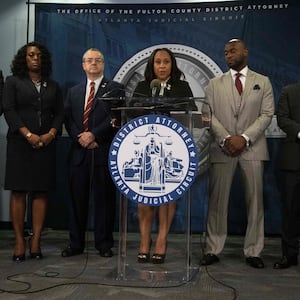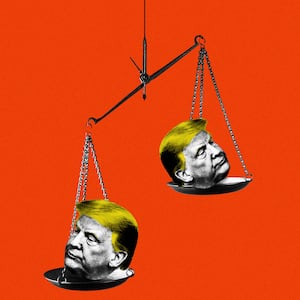Welcome to the Jackson Pollock school of prosecution. The 98-page indictment from Fulton County District Attorney Fani Willis is the legal version of Pollock’s style of throwing paint splatters on canvas as artistic expression. It basically makes every telephone call, tweets, and meeting a separate conspiratorial act.
There are 161 separate acts. Not surprisingly, everyone then becomes part of the conspiracy. The indictment covers 19 people, including Trevian Kutti (the former publicist for R. Kelly and Kanye West). Willis wants them all thrown into a single trial and let the jury figure it out.
But for all the disparate acts that Willis says constitutes a criminal conspiracy, part of this emerging picture should worry Trump.
SPLATTERING ACCUSATIONS EVERYWHERE
Pollock once advised confused observers that they needed to stop looking for objective meaning. The same may be true with the fourth Trump indictment. Willis simply treats every statement as a knowing falsehood and conspiratorial effort.
The indictment, to many, reads like the type of unabashedly biased spin that’s typically seen on cable television shows.
For example, the indictment relies on calls like the controversial one Trump had with Georgia officials)" href="https://urldefense.com/v3/__https://www.washingtonpost.com/politics/trump-raffensperger-call-transcript-georgia-vote/2021/01/03/2768e0cc-4ddd-11eb-83e3-322644d82356_story.html__;!!LsXw!S3PIv_JChix_mDc8c5gqzpRF36FC0VC2VFQLsHJqpDuMlXSu1nulNV6dv7dyIT8q_DdP0-ymlmo7IW4f0lRx9-dbAAOUxA$">the controversial one Trump had with Georgia officials—a call long cited as indisputable evidence of an effort at voting fraud. In the call, Trump pushed his demand for a statewide recount. Trump had lost the state by less than 12,000 votes. When officials insisted that there was little likelihood that such a recount would make a difference, he stated, “I just want to find 11,780 votes, which is one more than we have because we won the state.”
The call is still cited as one of those 161 individual steps toward the criminal conspiracy. Even though the indictment effectively repackages the same claims as the federal prosecution, Willis insists that Trump should be effectively tried twice under these allegations.
It is easy to dismiss such a Pollock prosecution as political gamesmanship. The timing alone in bringing the case (which should have been brought two years ago) is enough for many to discount this prosecution. However, it does represent a serious threat to Trump. It has “legs” as an indictment that is not likely to be dismissed in its entirety before trial.
IT’S GOT LEGS
There are three reasons why this indictment could be the most perilous for Trump, as opposed to the Jan. 6 indictments, which present serious threshold constitutional questions)" href="https://urldefense.com/v3/__https://jonathanturley.org/2023/08/07/the-speech-as-conduct-theory-a-response-on-the-second-trump-indictment/__;!!LsXw!S3PIv_JChix_mDc8c5gqzpRF36FC0VC2VFQLsHJqpDuMlXSu1nulNV6dv7dyIT8q_DdP0-ymlmo7IW4f0lRx9-c6Jg5Hfw$">serious threshold constitutional questions.
First, the racketeering cases tend to be iron-plated before trial because challenges concern the interpretation of facts, which are traditionally questions left to the finder of fact (in this case a jury).
Willis is likely to argue successfully that she should be allowed to prove the case. In the course of that prosecution, Willis probably hopes that one or two of the 18 other defendants will flip and turn state’s evidence.
Second, in D.C., special counsel Smith is essentially trying to create new law, or at least stretch existing case law to the point of breaking down. Conversely, elections are left largely to the states, and state prosecutors routinely bring election-based prosecutions.
Willis may be stretching the evidence, but she is not stretching the law. Racketeering laws are routinely used far afield from their origins in combating criminal gangs.
Finally, as a state action, this is not a prosecution that can be ended prematurely with a presidential pardon. If Trump is elected, he could grant himself a self-pardon, even a preemptive pardon before trial. Various GOP presidential candidates have indicated that they will also consider a pardon. That could put an end to the Smith prosecutions before any trial if the special counsel cannot try the case before the election.
There is no federal pardon option for Georgia. Indeed, it is even hard to secure a state pardon, which is not issued by the governor but a pardon board.
None of this means that the indictment is justified. While the indictment contains a litany of calls and meetings, there is no clear evidence that Trump did not believe that the results of the election could be flipped through these challenges. The concern is that the indictment criminalizes challenges to elections.
In covering decades of presidential elections for CBS, NBC, BBC, and Fox, every election has produced challenges, including many with little support. This coverage included multiple challenges by Democratic lawmakers to the certification of Republican presidents in Congress.
It has also included challenges to voting machines.
For example, Marc Elias, who served as Hillary Clinton's campaign general counsel and played a role in the funding of the infamous Steele dossier on Russian collusion, has challenged past elections on such grounds)" href="https://urldefense.com/v3/__https://jonathanturley.org/2021/02/05/the-return-of-marc-elias-the-lawyer-implicated-in-the-clinton-dossier-scandal-is-back-in-the-news/__;!!LsXw!S3PIv_JChix_mDc8c5gqzpRF36FC0VC2VFQLsHJqpDuMlXSu1nulNV6dv7dyIT8q_DdP0-ymlmo7IW4f0lRx9-ef_Fcdew$">challenged past elections on such grounds. After the 2020 election, he challenged one New York election by claiming that “there is reason to believe that voting tabulation machines misread hundreds if not thousands of valid votes as undervotes, and that these tabulation machine errors disproportionately affected [the Democrat].”
That was no crime. Elias had every right to seek judicial review even though the claim was quickly rejected as unfounded.
Many of us disagreed with Trump after the election and publicly rejected the claims of systemic voting fraud. However, Trump had a right to not only challenge the election but to be wrong.
That is why the Willis indictment is a serious threat to Trump but also to our system of democratic process. Pollock once said that “when I am in my painting, I’m not aware of what I’m doing.” Unlike painters, prosecutors do not have the same luxury. What Willis is doing here is excessive and it is dangerous.









